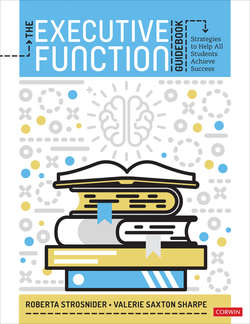Читать книгу The Executive Function Guidebook - Roberta Strosnider - Страница 37
На сайте Литреса книга снята с продажи.
What Is Working Memory?
ОглавлениеWorking memory is at the foundation for learning. According to Cooper-Kahn and Foster (2013) working memory is “the ability to temporarily hold information in one’s head to use it to complete a task” (p. 10). Working memory is sometimes referred to as short-term memory, but the problem is that short-term memory is linked more closely to long-term memory than what we previously thought. Kaufman (2010) defined working memory as “the cognitive mixing bowl in which new information is combined with background knowledge to allow for comprehension of spoken and written language” (p. 7). It is comprised of auditory memory (remembering what you hear) and visual-spatial memory (remembering what you see), but it is the efficient use of working memory that allows students to solve multistep mathematics problems and synthesize pertinent information into a research paper.
Working memory is a critical factor in school success. It helps students with things such as
retrieving information from long-term memory and holding on to it long enough to use it (short-term memory);
hindsight (learning from the past), forethought (being able to plan by remembering the information), anticipatory set (to predict based on memory), sense of time (to remember events and activities), and awareness of self-storing and remembering appropriate behaviors (Tam, 2014, pp. 351–353);
remembering instructions, especially with complex tasks; and
paying attention and staying on task.
Students who have problems with working memory may experience the following:
Have difficulty remembering sounds and words and forget what they have read
Have difficulty memorizing facts
Have difficulty remembering the steps of a process and stop in the middle if they start the process at all
Start talking and forget what they are saying in midsentence
Have difficulty forming letters for writing and remembering the sequence for spelling
Have difficulty remembering directions for completing assignments especially as directions become more complex
Initiate a task, then stop before completing it
Have a blank stare on their face
Check the work of others to see what they are doing
Consistently make the same errors in spelling and math
Demonstrate poor self-checking skills
Complete assignments but forget to submit them
Have difficulty remembering rules and procedures
May not profit by what they have previously learned
May not be able to predict what is going to happen based on previous experience
FIGURE 2.1 How Working Memory Builds on Long-Term Memory in the Learning Process
